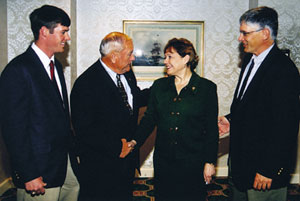Veneman: Tax Cut Would Help Farmers

Secretary of Agriculture Ann M. Veneman urged Alabama farmers to seek support for President Bush’s tax package from their congressmen during their recent trip to the nation’s capital.Veneman spoke to about 200 farmers who attended the Alabama Farmers Federation annual Washington legislative trip March 17. She said cuts proposed by the president would mean $4 billion in savings to farmers and ranchers in the U.S. this year. She said proposed acceleration of tax cuts such as elimination of the marriage tax penalty will help farmers, as would increasing limits on small business expenses from $25,000 to $75,000 annually.Veneman said trade will continue to be a top priority for her administration, noting that one-third of all acres planted in the U.S. go to export markets. These exports account for about one-fourth of all farm income.”I don’t think we want to cut off our exports and see one-third of our production have no where to go,” she said. “We’re looking at about $57 billion in exports projected for this year, compared to $53 billion last year.”Veneman noted several export issues that have directly affected Alabama farmers and the nation’s farm economy.”Poultry is our largest market to Russia,” Veneman said. “It has a big impact throughout the ag sector from grains to other proteins because of the backup in the market. We’re continuing to work on several fronts to advance a strong trade agenda.”Veneman told Marshall County poultry producer Dan Smalley that the Bush administration is considering retaliation against Russia for its recent proposal to put tariffs and quotas on the chicken products it imports from the United States. “We haven’t ruled out trade actions,” Veneman said. “That is one of the most important markets for poultry.”Veneman said USDA and the president are exploring new opportunities at home and abroad for agricultural items, including alternative fuels.”Energy is a very important component of this administration,” Veneman said. “Agriculture has a vested interest in energy not only as a big user but as a producer of alternative energy. Renewables are certainly something clearly recognized as a way to generate more energy. The president is a strong supporter of renewables such as ethanol.”Alabama Power Co. and Southern Company have produced electricity by co-firing switchgrass and other biomass fuels with coal. Advocates of biomass note that it is a renewable resource that provides a market for Alabama farmers while decreasing the pollution emitted from coal-fired plants.Jimmy Parnell, a timber and cattle farmer from Chilton County, told reporters he is encouraging Congress to offer tax credits for utility companies that invest in ways to burn wood chips along with coal. The normal thinning of a pine plantation would produce small and inferior trees that could be shredded and burned alongside coal, improving the health of the tree stand and supplementing the fuel source for the electricity producer.”We have to think outside the box,” Parnell said. “This could be environmentally friendly and give us some friends we don’t normally have.”Alabama farmers held further discussions about renewable fuel sources during a meeting with Larry Schafer, legislative counsel for the Renewable Fuels Association.Veneman told Alabama farmers that USDA is working to implement the new farm bill and is reviewing other important programs such as risk management, new conservation and environmental practices, the disaster bill and biosecurity. She also used the meeting as an opportunity to announce the approval of over $12.5 million in loans and grants for rural development (see story this page). While in Washington, Alabama farmers also heard from Alabama Republican Sens. Richard Shelby and Jeff Sessions and Sen. Thad Cochran, R-Miss., who is chairman of the Senate Agriculture Committee. They also attended breakfast meetings with their congressmen during which they discussed the Bush tax cut, the war in Iraq and agricultural funding issues.
